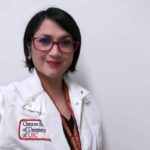As dentists and any other healthcare providers, we continually evolve with new research, techniques, and technologies. Attending professional conferences is an invaluable opportunity to stay updated, network with peers, and enhance practice.
These past weeks, four important conferences were held in the subdisciplines of Orofacial pain (The American Academy of Orofacial Pain 48th Scientific meeting in Scottsdale), Oral Medicine (The American Academy of Oral Medicine meeting in Orlando), Oral Pathology (The American Academy of Oral and Maxillofacial Pathology in Orlando) and Medical informatics (The American Medical Informatics Association Clinical Informatics Conferences in Minneapolis).
Like what you’re learning? Download a brochure for our Orofacial Pain and Oral Medicine certificate or master’s degree program.
The distance learning department of the Herman Ostrow School of Dentistry has long recognized the importance of attendance and the value of these meetings. This year, 2024, was no exception (Photo 1).

Photo 1: USC faculty, alumni, and current students of the Distance learning and residency programs in orofacial pain and oral medicine at the American Academy of Orofacial Pain 48th Scientific meeting in Scottdale, Arizona.
We encourage our students and faculty to attend these conferences and meetings to get the most out of them. Below are listed some of the most valuable resources a professional in the field can gain.
Continuing Education and Professional Development
One of the most significant benefits of attending these conferences is access to continuing education (CE) opportunities. They offer workshops, seminars, and hands-on training sessions that count toward CE credits required for maintaining dental licensure and diplomat status for the board-certified attendees in each subdiscipline. These sessions cover various topics, from the latest advancements to new surgical techniques and patient management strategies.
Networking Opportunities
Conferences gather dental professionals from various regions and specialties, creating a rich environment for networking. Building a professional network can lead to collaborative opportunities, mentorship, and the sharing of best practices. Engaging with peers allows us to discuss common challenges and solutions, enhancing their clinical and business practices.
Networking is also beneficial for career advancement. Meeting industry leaders and potential employers can open doors for new job opportunities or partnerships. A strong professional network is an asset in any field, and dentistry is no exception.
Exposure to Research and Technology
Conferences often feature exhibitions where companies showcase the latest products and technologies. Attendees can explore new equipment, software, and materials that can improve patient outcomes and practice efficiency. Being among the first to adopt new technologies can set a professional practice apart from the competition.
Moreover, conferences typically include presentations of the latest research in the field. Attending these sessions lets you stay abreast of scientific advancements and consider how new findings might be integrated into their practice. This knowledge is critical for providing evidence-based care and maintaining clinical excellence. Our students and faculty involved in research in our department are encouraged to present their work (Photo 2) that reflects the importance of evidence-based orofacial science. These conferences are often presented with poster and oral presentation sessions.

Photo 2: Poster presentation AMIA CIC 2024.Research project title: Bayesian Exploration: A New Clinical Decision-Support Tool. Authors: Anette Vistoso Monreal, Nicolas Veas, Gerald Loeb, Glenn Clark
Professional Recognition and Development
Presenting at conferences (Photo 3) can significantly enhance a professional profile. Sharing research findings, clinical cases, or innovative techniques helps establish a dentist as an expert in their field. It can also lead to invitations to speak at other events, write for professional journals, or participate in industry advisory boards.
Recognition from peers and industry leaders can bolster your reputation and credibility, which is invaluable for career growth and patient trust.

Photo 3: Poster presentation American Academy of Oral Medicine Conference 2024.Research project title: Concomitant Acute Oral Pigmentation and Desquamative Gingivitis Onset: A Case Report of Adrenal Gland Disorder and Vesiculobullous Disease. Authors: Rekha Jayaprakash, Anette Vistoso Monreal, Parish P. Sedghizadeh
Inspiration and Motivation
Conferences can be a source of inspiration and motivation. Hearing from leading experts and witnessing peers’ enthusiasm can reignite a passion for healthcare. Learning about innovative approaches and success stories can inspire new ideas and improvements in one’s own practice.
This boost in motivation can lead to enhanced job satisfaction and a renewed commitment to patient care. The energy and excitement of a conference often translate into a more dynamic and forward-thinking approach to everyday practice.

Photo 4: Opening lecture about Evidence-based dentistry and critical thinking at the AAOP meeting in 2024.
Staying Competitive
In the ever-evolving field of healthcare, staying competitive means staying informed. Attending conferences ensures healthcare professionals know the latest trends and best practices. This knowledge is critical for making informed decisions about practice management, patient care, and long-term strategic planning.
Patients are increasingly informed and expect their healthcare providers to be up to date with the latest treatments and technologies. Dentists and all healthcare providers can meet these expectations by attending conferences and providing high-quality, cutting-edge care.
Conclusion
Attending these conferences is an investment in professional growth and practice excellence. The benefits are numerous, from continuing education and networking to exposure to new technologies and professional recognition. By staying engaged with the broader healthcare community through conferences, you can remain at the forefront of your profession, providing the best possible care for your patients.
Earn an Online Postgraduate Degree in Orofacial Pain and Oral Medicine
Are you interested in a variety of issues focused on orofacial pain, medicine and sleep disorders? Consider enrolling in the Herman Ostrow School of Dentistry of USC’s online, competency-based certificate or master’s program in Orofacial Pain and Oral Medicine.


